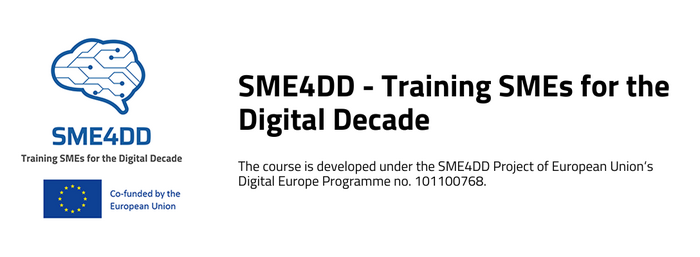25 March - 27 March - 1 April
3 April - 8 April - 10 April
13:00-17:00 CET
English
Online
free; certificates issued only to European SME employees/owners, freelancers and job seekers successfully finishing the course
Dive into the world of Ethereum and smart contract development with our comprehensive three-week course. From blockchain basics to advanced smart contract patterns, this hands-on program covers everything you need to know to get started with building decentralized applications (dApps) on Ethereum. Learn about both public and private Ethereum networks, explore verification and validation (V&V) techniques, and gain practical experience with industry-standard tools and frameworks (like Hardhat and Besu).
What we offer
- A comprehensive three-week course combining lectures and hands-on labs
- Expert-led instruction on Ethereum, smart contracts, and dApp development
- Access to industry-standard development tools and frameworks
- Practical experience with both public and private Ethereum networks
- Exposure to standard security, verification, and validation (V&V) techniques
- Insights into advanced topics like Layer 2 solutions and blockchain interoperability
What you will gain
- Intermediate level knowledge of Solidity programming and smart contract development
- Ability to design, deploy, and manage decentralized applications (dApps)
- Understanding of Ethereum's architecture, including the EVM and consensus mechanisms
- Skills to implement and work with various token standards (ERC20, ERC721 (NFTs))
- Knowledge of security best practices and common vulnerabilities in smart contracts
- Hands-on experience with Besu for enterprise Ethereum solutions
- Capability to apply verification and validation (V&V) techniques to blockchain projects
- Insight into the broader Ethereum ecosystem and its potential business applications
- Knowledge where to learn more and further expand your skills
The course is for
This course is recommended for technical professionals, primarily developers and designers, regardless of their experience with blockchain technologies. The course aims to equip participants with the skills necessary to harness the potential of Ethereum, smart contracts, and dApps, regardless of their blockchain background.
Prerequisites
Basic proficiency in developing and operating IT systems. Preferably basic knowledge of UNIX/Linux-based systems, Docker, and basic experience with modern programming languages like JavaScript.
To get the most out of this course, we recommend completing some of the CryptoZombies tutorial before attending. This will provide a helpful foundation in Solidity programming and basic smart contract concepts.
Lecturers

Dr Imre Kocsis
Senior Lecturer
Budapest University of Technology and Economics (BME)
Dr Imre Kocsis
Dr Imre Kocsis is an Associate Professor at the Department of Artificial Intelligence and Systems Engineering of the Budapest University of Technology and Economics (BME), and the head of the blockchain laboratory at the Critical Systems Research Group. His key research areas are the systems engineering and end-to-end resilience assurance of blockchain-based applications.
He is leading the participation of BME in the Linux Foundation's Distributed Trust Foundation and leads the Education Workgroup of the Hungarian Blockchain Coalition.

Dr Attila Klenik
Senior Lecturer
Budapest University of Technology and Economics (BME)
Dr Attila Klenik
Dr Attila Klenik (PhD) earned his doctorate at the Budapest University of Technology and Economics and is an expert in blockchain and distributed ledger technology. His research focuses on performance modelling and designing systems for service security. In addition to his academic knowledge, he has extensive experience in industrial design and implementation in the field.

Bertalan Zoltán Péter
Blockchain Expert
Budapest University of Technology and Economics (BME)

